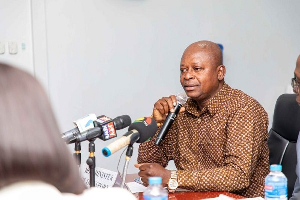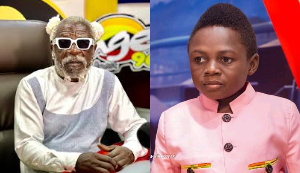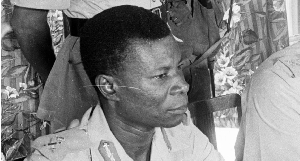Overseas-based Nigerian publisher of Business in Africa, Everest Ekong may have fallen victim of the zero-tolerance-for-corruption trap of the Ghanaian John Kuffour government. He was arrested and detained by the Ghana Bureau of National Investigations (BNI) for allegedly colluding with others to defraud Ghana of C15 billion ($2.14 million) (N288.46 million).
Ekong, the managing director of Ghana-based top-flight communication outfit, Goldcity Communications Group (GCGL), was reportedly arrested alongside Emmanuel Agbodo, former chief executive of the Divestiture Implementation Committee (DIC).
The John Kuffour administration had, shortly after assuming office seven months, ago set up various anti-corruption schemes to clean Ghana of perceived over-blown corruption machinery, inherited from the former Jerry Rawlins' government. Among its recent victims was a Minister of youths and Sports who has since been clamped in jail for causing the state to lose about C46 million due to mishandling of a project.
News of arrest and detention of the Nigerian publisher and Agbodo was top of media reports last week in Ghana. It was cover story of the influential The Ghanaian Times last Friday while a television station gave it ample coverage at prime time same day.
Ekong who is about to re-launch the Business in Africa(formerly Safara) publication, was indicted by a special audit ordered by Office of the President and National Security Council, into payments, bank statements and other documents related to payments made by the Divestiture Committee to the Goldcity Communications, according to the Times.
Staff of Ekong's Goldcity Communications in a telephone interview with The Guardian in Accra on Friday, confirmed his arrest and detention. But they claimed that the details of the alleged fraud as published in the various Ghanaian media, were not totally correct.
Agbodo, former Chief Executive of the DIC was alleged to have between May and December 2000, authorised the payment of C18 billion to Ekong's GCGL for various services including consultancy and advertisements.
The payments were said to have seen made out of proceeds from the sale of divested state enterprises. This, it was contended, ran contrary to recommendations of the Act establishing the Divestiture Committee, which stipulates that expenditures on such services as advertising and consultancy, should be paid under the Public Enterprise and Privatisations Technical Assistance Project (PEPTA). The project is funded by the World Bank to which the DIC is a beneficiary.
While concluding that payments to Ekong's company constituted a "misapplication of funds since there was no evidence of approvals from the Ministry of Finance," officials of the Bureau of National Investigations, an equivalent of Nigeria's Justice Akanbi-led anti-graft panel, said Ekong had run foul of the Kuffour zero-tolerance-for-corruption policy. He is thus liable for trial and consequent sanction.
Also indicted with Ekong and Agbodo were Angelo Lassey, Assistant Accountant to the DIC and Siegfried Sedziafa, a Public Relations consultant to the Committee. But they are said to be on the run.
The special presidential audit, which exposed the deal also alleged that of the C18 billion paid for advertisements and other expenditures, only about C3 billion was utilised for advertisements and other promotional activities, said the Times. It added that there were indications that the remaining C15 billion "was stolen or diverted for their private use."
Sedziafa, the PR consultant to the Divestiture Committee, was alleged by the audit, to be both a director and signatory to all the accounts of the GCGL at the OSU branch of the Barclays Bank. Likewise, Angelo Lassey, the assistant accountant to the DIC "doubled as the accountant for GCGL".
The two officials of the Divestiture Implementation Committee were alleged to have, between September 2000 and March 2001, "connived and cashed cheques from the dollar, pound sterling and cedi accounts by the GCGL," according to the BNI officials.
While Ekong was claimed to have occasionally signed cheques for withdrawals from the C18 billion lodged at the bank, Lassey and Sedziafa were alleged to have done most of the withdrawals.
At the Business in Africa office, located on the first two floors of the prestigious Pyramid House on Ring Road, Nima Accra, officials told The Guardian, they too had only read the news in the media. Busy with preparing the first edition of the repackaged publication, they claimed they were yet to get in touch with their publisher, Ekong. Though, Ekong and Agbodo had been charged, they were still in custody of the Bureau of National Investigations (BNI).
Unfortunately for Nigeria however, just as news of Ekong's arrest and detention was being flashed in the media with the Nigerian's name and his nationality frequently mentioned, another story of a five-man fraud syndicate led by three Nigerians, was being celebrated.
The five-man team of '419' syndicate was said to have been apprehended last Monday by the Togolese security agencies.
The Nigerians -- Linus Ochoulo, Steve Ochendu and Evencs Ochendu were alleged to have colluded with Prince Owundu and Chimar Ebere, both Togolese to defraud a group of Ghanaian businessmen and traders in Accra and Kumasi.
Officers at the Ghana Police Headquarters, Accra, said the men were arrested by Togolese security men after a large sum of money in various currencies was found in their possession. The officers advised Ghanaians who might have fallen victims of the syndicate to contact the Interpol Unit at the Criminal Investigations Department, Accra, to identify the suspects.
Expectedly, these two news items which ruled the Ghanaian media waves for most part of the weekend, doused the wide-spread positive response which the victory of the Nigerian Super Eagles' trashing of the Ghanaian Black Stars last weekend in Port Harcourt generated in Accra, the Ghanaian capital.
General News of Tuesday, 7 August 2001
Source: The Guardian (Lagos)












